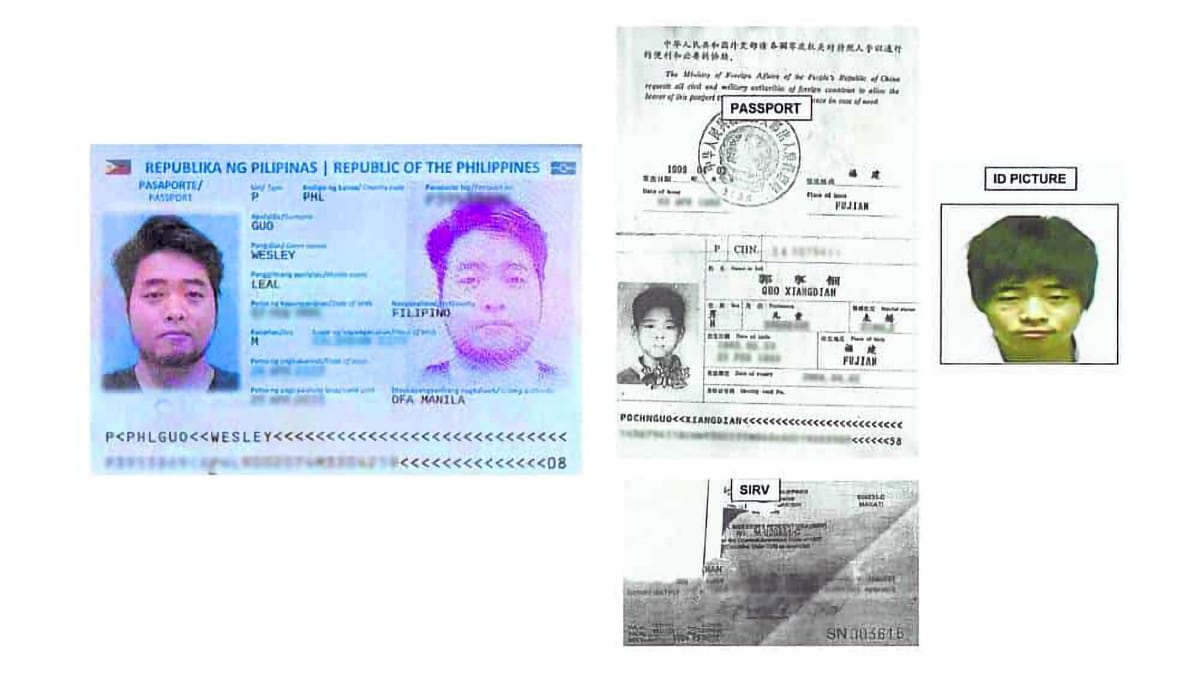
SENATE SCRUTINY TURNS TO SIBLING Documents obtained by Sen. Sherwin Gatchalian appear to show that Alice Guo’s brother Wesley is from China: a copy of his Philippine passport (top left), an ID picture and special investor’s resident visa (SIRV) issued to Guo Xiang Dian, a Chinese boy who entered the country in 1999, and his Chinese passport (right) —photos courtesy of the office of Senator Gatchalian
MANILA, Philippines — The fingerprints of a Chinese boy who arrived in the country in 1999 have matched those of the younger brother of suspended Bamban, Tarlac Mayor Alice Guo, Sen. Sherwin Gatchalian disclosed on Wednesday.
According to Gatchalian, the results of the National Bureau of Investigation’s fingerprint analysis showed that Guo Xiang Dian was the same person as Wesley Leal Guo, one of Guo’s three siblings.
READ: NBI findings prove Alice Guo ‘a fake Filipino’ – senators
At the same time, NBI Director Jaime Santiago said the bureau was puzzled by the discovery of a third Alice Guo who sought and obtained clearance from the NBI in Project 8, Quezon City, in 2005.
The woman had the same birthday and birthplace as the mayor, but their fingerprints did not match, and the address indicated did not exist.
Santiago offered a reward for any information on the whereabouts of the third Alice Guo to help them with their investigation.
“Someone might have instructed her to get a clearance and use the name of Alice Guo,” he said.
The suspended mayor applied for an NBI clearance in 2021, and her fingerprints were found to be a match for the alien fingerprint records of a Chinese national named Guo Hua Ping, which were taken in 2006. This confirmed speculations that the Bamban official was a Chinese citizen.
No bearing on other findings
Santiago, however, clarified that the discovery of a third Alice Guo would not affect their findings that the Bamban mayor and Guo Hua Ping were the same person.
“Whatever the result, [it will] not affect the action of the [Commission on Elections] and Senate,” he said.
Alfred Kahanding, NBI dactyloscopy division chief, said that fingerprints were an “infallible means of identification.”
“It is incapable of error. It is an absolute means of identification … No two prints of different persons nor the neighboring fingers of the same persons have ever found to be identical,” Kahanding said.
Brother’s case
As for the Tarlac mayor’s brother, Gatchalian said the NBI obtained Xiang Dian’s fingerprints from the records of the Board of Investments (BOI) while those of Wesley were taken from the NBI’s biometric records.
“Guo Xiang Dian is Wesley Leal Guo,” Gatchalian said in a statement. “This again demonstrates that the late registration process was abused by the Guo family to falsely claim that they are Filipinos.”
Like the suspended Tarlac mayor, Xiang Dian had a Chinese passport and an application for a special investor’s resident visa, copies of which were shared by Gatchalian with the media.
He also showed Wesley’s Philippine passport, which was issued by the Department of Foreign Affairs in Manila, suggesting a violation of Republic Act No. 8239 or the Philippine Passport Act of 1996.
Gatchalian said that records from the BOI revealed that Xiang Dian first entered the country in 1999 as the dependent son of Chinese citizen Lin Wen Yi.
Lin, who was listed as an incorporator of several companies owned by the Guos, was the mayor’s real birth mother, Gatchalian claimed earlier, based on documents he secured.
Also on Wednesday, Commission on Elections (Comelec) Chair George Erwin Garcia said the poll body would ask the NBI for the evidence it gathered on the true identity of the Bamban Mayor.
“We will officially request for the report and findings about the fingerprint examinations and such other examinations that the NBI is conducting so that we can use these evidence in building up a case, if any,” Garcia said in a press conference with Santiago after a meeting at the Comelec central office in Manila.
Garcia said that misrepresentations made in a certificate of candidacy (COC) constitute an election offense punishable by three to six years in jail under the Omnibus Election Code.
The candidate may also be charged with falsification and perjury since the COC was made under oath.